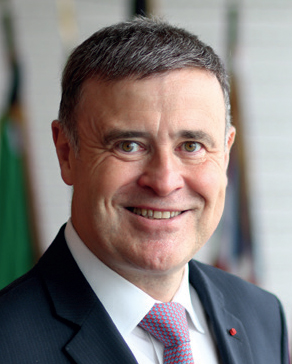For ESCP's Dean and Executive President Frank Bournois, the debate on the emergence of a European university model is to be welcomed. Recent advances such as President Macron's commitment, in his speech at the Sorbonne in September 2017, or the guidelines adopted in Paris on the occasion of the Bologna Conference in May 2018, should be applauded.
 Let us recall however that the European nature of higher education cannot be imposed by decree. Universities that are already implementing European educational pathways are well aware of this. Essential European-mindedness is a full-time job because European-ness is a demanding choice. Building an integrated European-wide university is a project exceeding by far simple cooperation between national universities. All stakeholders, teachers, students and staff, must be ready to live a cultural adventure that defocuses them from their usual environment. At a time when European integration appears to have stalled for quite some years, could there be a more fitting symbol than launching, through education and knowledge production, a fresh Renaissance for young people?
Let us recall however that the European nature of higher education cannot be imposed by decree. Universities that are already implementing European educational pathways are well aware of this. Essential European-mindedness is a full-time job because European-ness is a demanding choice. Building an integrated European-wide university is a project exceeding by far simple cooperation between national universities. All stakeholders, teachers, students and staff, must be ready to live a cultural adventure that defocuses them from their usual environment. At a time when European integration appears to have stalled for quite some years, could there be a more fitting symbol than launching, through education and knowledge production, a fresh Renaissance for young people?
As a two-hundred-year-old business school (est. 1819), we at ESCP have built an integrated model of a European university that reveals seven major markers that are essential to such a project.
The effective presence in several countries is the first marker of integration, as the very notion of a university refers to physical places where knowledge is produced and delivered on several campuses.
The second marker is a comprehensive education on Europe: its history, its cultural diversity and its institutions, not forgetting its necessary relationship to the world. This approach must infuse teaching in all the specialty areas.
The third marker is the creation of a unique faculty, attached to each campus and guaranteeing a consistent academic level. This cultural cross-fertilization allows for the exchange of good practices and the implementation of joint work and research programmes.
Seven markers which must be tackled by Europe
Fourth marker: research based on comparative approach. This is particularly true in research in the humanities and social sciences where the European model has its place alongside the domineering Anglo-Saxon model.
As education is not yet a shared competence, the European Union provides support and coordination for its Member States. In the absence of single European diplomas, the fifth marker is national recognition in each country where the university is established.
Sixth marker: beyond the production and transmission of knowledge, the ambition of a European university is the professional insertion of its graduates in all public or private sectors throughout the Union.
Naturally, the seventh and no less important marker is students’ diversity and mobility, which must be assessed and promoted.
These seven markers, that challenge Europe’s principle of equality of education for all its citizens, as much as its much needed "soft power", must be tackled by Europe, and quickly.
Campuses
